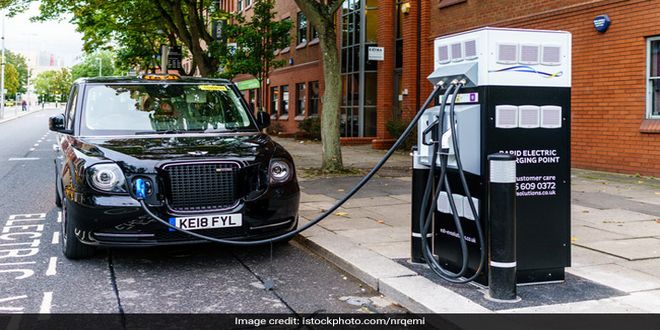New Delhi: To encourage local manufacturing of electric vehicles (EVs), the Union Cabinet chaired by Prime Minister Narendra Modi on Thursday (March 7) approved setting up of a National Mission on Transformative Mobility and Battery Storage to create a Phased Manufacturing Program (PMP) and drive indigenous production of electric vehicles and development of batteries and cell-manufacturing projects in the country.
Announcing the approval of the mission and the PMP, Amitabh Kant, CEO of NITI (National Institution for Transforming India) Aayog called it a ‘great move’ and shared on his social media account,
Cabinet approving National Mission on Transformative Mobility and Battery Storage” will ensure ‘Make In India’ innovation for safe, adequate, holistic infrastructure for mobility. India offers unparalleled speed, scale, and size for the multi-modal, sustainable, intelligent ecosystem.
#Cabinet approving National Mission on Transformative Mobility & Battery Storage will ensure @makeinindia innovation for Safe,Adequate,Holistic Infra (#SAHI) for mobility.#India offers unparalleled speed,scale & size for multi-modal,sustainable, intelligent ecosystems.Gr8 move! pic.twitter.com/LM67wJAntK
— Amitabh Kant (@amitabhk87) March 7, 2019
Also Read: Customs Duty On Electric Vehicles Parts Increased From 2020, To Boost Local Production
Aspiring to make the future of mobility clean, green and emission-free, NITI Aayog posted on social media that through this mission, India’s mobility ecosystem will be boosted using ‘Make in India’ solutions. It said,
A Phased Manufacturing Programme to localise production across the Electric Vehicles value chain is a vital part of the approved National Mission on Transformative Mobility & Battery Storage.
A Phased Manufacturing Programme to localise production across the Electric Vehicles value chain is a vital part of the approved National Mission on Transformative Mobility & Battery Storage. #CabinetDecisions
Boosting #India's mobility ecosystem through @makeinindia solutions! pic.twitter.com/j6xGgm23Yd
— NITI Aayog (@NITIAayog) March 8, 2019
The National Mission on Transformative Mobility & Battery Storage will ensure holistic & comprehensive growth of the battery manufacturing industry in #India. #CabinetDecisions
The #FutureOfMobility is clean, green and emission-free. pic.twitter.com/BUU1aZTkYO
— NITI Aayog (@NITIAayog) March 10, 2019
A Phased Roadmap To Implement EV And Battery Manufacturing: Salient Features Of The Mission
The Phased Manufacturing Programme will act as a roadmap for the industry to make necessary investments to localise EV and component production and enable the country to manufacture batteries at large-scale with an initial focus on the battery pack assembly plants by 2019-20, followed by integrated cell manufacturing by 2021-22.
PMP will be valid for five years that is till 2024 and will be monitored by an inter-ministerial steering committee chaired by NITI Aayog.
The scope of the mission covers electric two-wheelers, three-wheelers, four-wheelers, buses and trucks, Lithium-ion cells, battery packs, chargers, and parts used in manufacturing EVs like electric motors, motor controller, electric compressor, and braking system.
The setting up of this mission along with the PMP will encourage local manufacturing of batteries for electric vehicles (EVs), said Society for Manufacturing of Electric Vehicles (SMEV), an industry body. Terming the Cabinet’s approval to the plan a ‘good move’, SMEV also said that it would help in significantly reducing the cost of EVs. Sohinder Gill, director general, SMEV said, “If implemented successfully, the mission should make India self-reliant on the most important element of EVs and also help significantly bring down the cost of the vehicles.”
Also Read: Industry Welcomes The Much Awaited FAME II, Says It Has Fast Tracked Adoption Of Electric Vehicles
According to Mr. Gill, given government thrust on e-mobility, manufacturing electric vehicles and their components can become a lucrative business proposition in the near future. For some industry players like Avan Scooters and Jitendra EV, government interventions in battery storage will give a tremendous boost to two important goals – generate clean energy and transition to electric vehicles in the coming years.
Apart from approving the National Mission for Transformative Mobility, the government has been taking several initiatives to boost adoption of electric mobility. The Cabinet last month approved a Rs 10,000 crore initiative under the Faster Adoption and Manufacturing of Electric Vehicles II (FAME II) scheme, marking a significant push for hybrid and electric vehicles in the country. The FAME II scheme will be executed over three years starting from April 1. It is the revised and enhanced version of the existing FAME India I scheme, which was introduced in April, 2015 and earlier included a total of investment of Rs. 895 crore. Ministry of Power and Ministry of Housing and Urban Affairs also announced its plan to develop EV charging infrastructure by setting up charging point in every 3km square area and one on both sides of major highways at every 25 km stretch.
The push towards electric and hybrid vehicles has increased in the country recently due to the rising air pollution problem. As per a 2018 report of World Health Organisation (WHO) 14 of 20 most polluted cities in the world were in India with vehicular pollution as the major culprit. The latest data compiled by the IQAir AirVisual in collaboration with Greenpeace Southeast Asia finds that India has become home to 15 of the 20 most polluted cities in the world.
NDTV – Dettol Banega Swachh India campaign lends support to the Government of India’s Swachh Bharat Mission (SBM). Helmed by Campaign Ambassador Amitabh Bachchan, the campaign aims to spread awareness about hygiene and sanitation, the importance of building toilets and making India open defecation free (ODF) by October 2019, a target set by Prime Minister Narendra Modi, when he launched Swachh Bharat Abhiyan in 2014. Over the years, the campaign has widened its scope to cover issues like air pollution, waste management, plastic ban, manual scavenging and menstrual hygiene. The campaign has also focused extensively on marine pollution, clean Ganga Project and rejuvenation of Yamuna, two of India’s major river bodies.




























